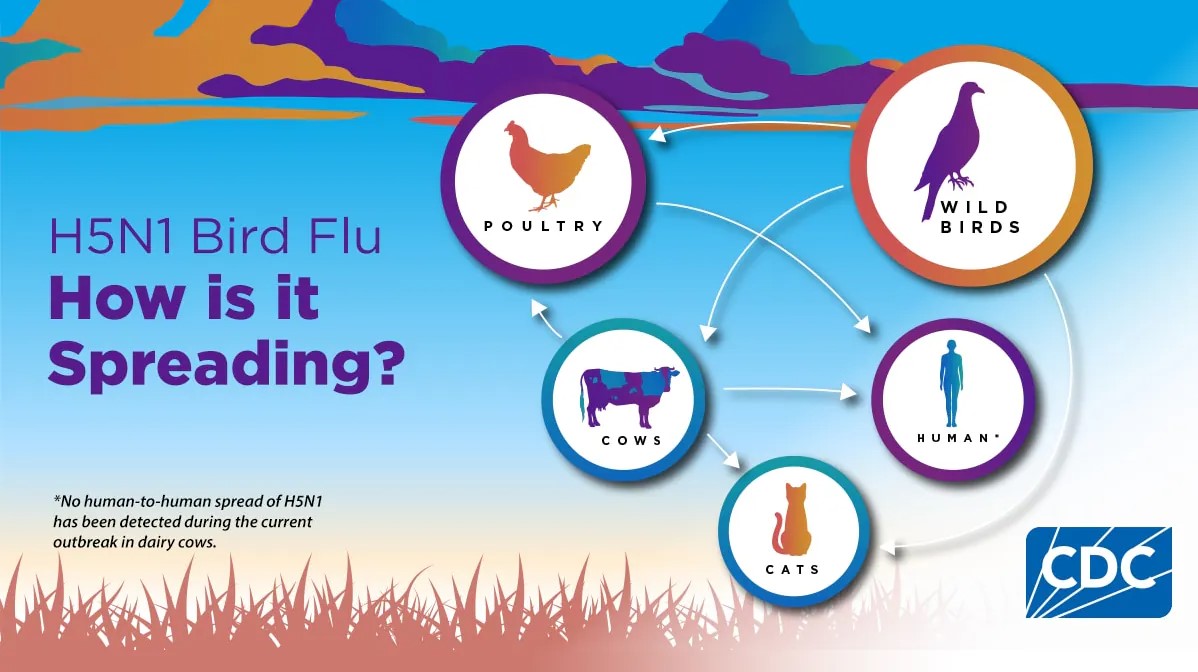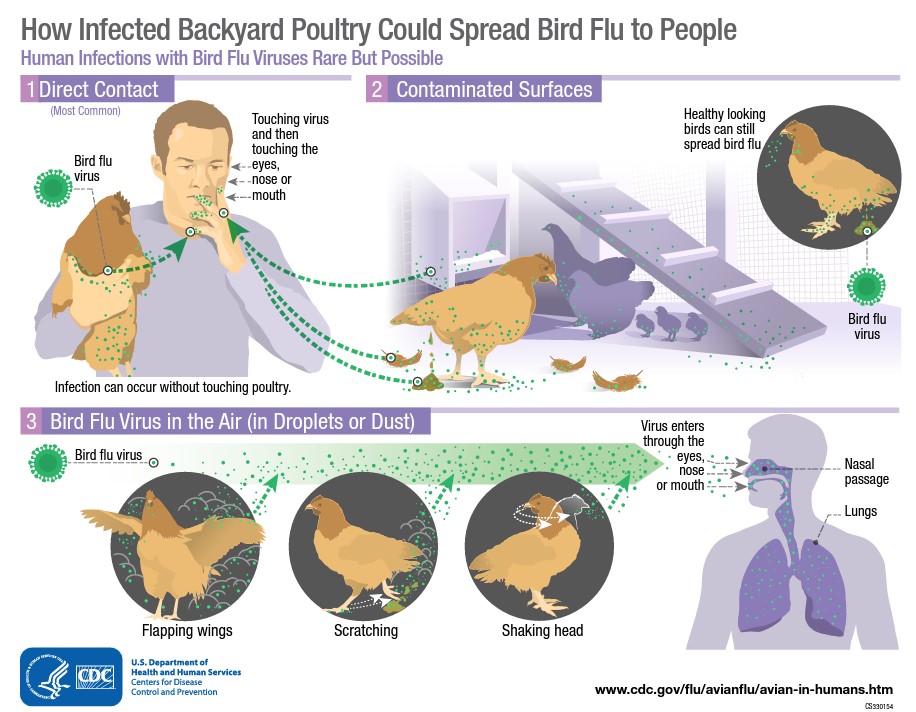DHHS → MeCDC → Disease Surveillance → Maineflu → Avian Influenza and People
Avian Influenza (Flu) and People
On this page:
- What Is Avian Flu?
- How Does Avian Flu Spread to People?
- Symptoms of Avian Flu in People
- What to Do If You Experience Symptoms
- How to Prevent Avian Flu
- More Information about Flu In Animals
What Is Avian Flu?
Avian influenza, or bird flu, refers to a respiratory disease caused by infection with a type of influenza (flu) viruses that are typically found in birds. Avian flu viruses normally live in wild water birds, like ducks and geese, around the world. These viruses can spread to domestic birds, like chickens, ducks, geese, guinea hens, and turkey. They can also spread to some other wild and domestic animals, like seals, foxes, cats, and cattle.
Avian flu viruses do not normally make humans sick but human infections with avian flu viruses have occurred. People who have regular contact with poultry, cattle, or wild birds are most at risk.
How Does Avian Flu Spread to People?
Humans can become infected with avian flu viruses, but this is very rare. The risk of infection is highest for people who work with infected wild or domestic animals or unpasteurized (raw) milk.
Infected birds have avian flu virus in their saliva, mucous, and feces. People and animals can become infected by having contact with virus from infected birds or other animals. People can get avian influenza by:
- Touching bedding, feed, or water contaminated with waste from infected animals, then touching their eyes, nose, or mouth.
- Breathing in the virus in contaminated respiratory droplets or dust.
- Working with or drinking raw milk from infected animals.
The spread of avian flu virus from one infected person to another is very rare. When it happens, it usually only spreads to a few people. However, since avian flu can cause severe symptoms in some people, monitoring for human infection and preventing the spread of avian flu is very important.
Download How Infected Backyard Poultry Could Spread Bird Flu to People (PDF).


Symptoms of Avian Flu in People
Symptoms of avian flu in people include:

Cough

Headache

Shortness of breath or difficulty breathing

Sore throat

Fever or Chills

Fatigue

Congestion or runny nose

Muscle or body aches
Other symptoms include diarrhea, eye irritation, nausea or vomiting, rash, and sneezing.
What to Do If You Experience Symptoms
If You Think You Have Avian Flu
Contact your healthcare provider if:
- You have any of the symptoms above AND
- You have recent contact with infected animals, or contact with unpasteurized (raw) milk
Make sure to mention any recent exposure to infected animals or raw milk. The only way to tell if you have avian influenza is by taking a flu test. Your healthcare provider can test you for flu.
There is treatment available for avian flu. U.S. CDC recommends that any person with avian flu start antiviral treatment as soon as possible. Your healthcare provider can prescribe this for you.
Avian Flu Fact Sheet - I Think I Was Exposed. What Should I Do? (PDF)
If You Have A Known Exposure To Infected Animals or Contaminated Animal Products
If you become sick within 10 days of your last exposure to infected animals or contaminated animal products (like raw milk), isolate at home away from other household members. Do not go to work or school until you get a flu test to prove you do not have avian flu virus and you recover from your illness. Report your symptoms, as well as your recent exposure to infected or sick birds, to a healthcare provider. Follow all instructions from your state health department.
Your household members should monitor their health for 10 days from their last exposure to you. If they experience any symptoms during this time, especially respiratory symptoms, report symptoms to a healthcare provider.
Avian flu monitoring resources:
How to Prevent Avian Flu
Avoid sources of exposure:
- Generally, avoid direct contact with wild birds. Observe them only from a distance. Wild birds can be infected with avian flu even if they do not look sick.
- Avoid unprotected contact with domestic animals, especially poultry, that look sick or have died.
- Do not touch surfaces that may be contaminated with saliva, mucous, or feces from wild or domestic birds or other animals.
- Do not visit the flocks of family, friends, or neighbors, especially if any of their or your birds are sick.
- Wash your hands after handling raw chicken, turkey, other poultry, or eggs.
- Do not cross contaminate food. Keep raw poultry and eggs away from ready to eat and uncooked foods.
- Fully cook chicken, turkey, and other poultry to 165°F.
- Avoid raw dairy products. Consume pasteurized dairy products instead.
If you are an Avian Flu Outbreak Responder:
- Use protective equipment, including gloves, a medical facemask, and eye protection. Throw away your gloves and facemask after use.
- Wash your hands with soap and water after touching birds.
- Change your clothes before having contact with healthy domestic poultry and after handling wild birds.
- Monitor yourself for symptoms and follow all instructions from your state health department.
If you work with domestic or wild animals:
For poultry owners and agricultural producers:
- Practice good biosecurity and prevent wild birds from contacting your birds.
- Look for signs of illness in your birds. Report sick birds or unusual bird deaths to USDA's toll-free number at 1-866-536-7593 or your State Veterinarian's Office.
- Follow USDA's Guidance for Poultry Producers.
- Find more information and useful checklists on all of these topics at USDA's Defend the Flock.
For dairy cattle owners and dairy workers:
- Avian flu (H5N1) guidance for farm workers (PDF) | Guía sobre el H5N1 para trabajadores de granjas (PDF)
- Protect Yourself from H5N1 PPE Fact Sheet (PDF) | Protejase del Virus H5N1 (PDF)
- Maine CDC Personal Protective Equipment (PPE) Request Form (.xslx) | also in (PDF)
If you are a hunter:
- Dress game birds in the field whenever possible.
- Wear gloves when dressing birds and wash your hands with soap and water afterwards.
- Follow USDA's Guidance for Hunters (PDF).
More Information about Flu in Animals
- Maine Department of Agriculture Avian Flu Resources
- Maine Department of Agriculture Home Page
- Maine Department of Agriculture's Animal Health and Industry Disease Information
- USDA Defend the Flock! Program



